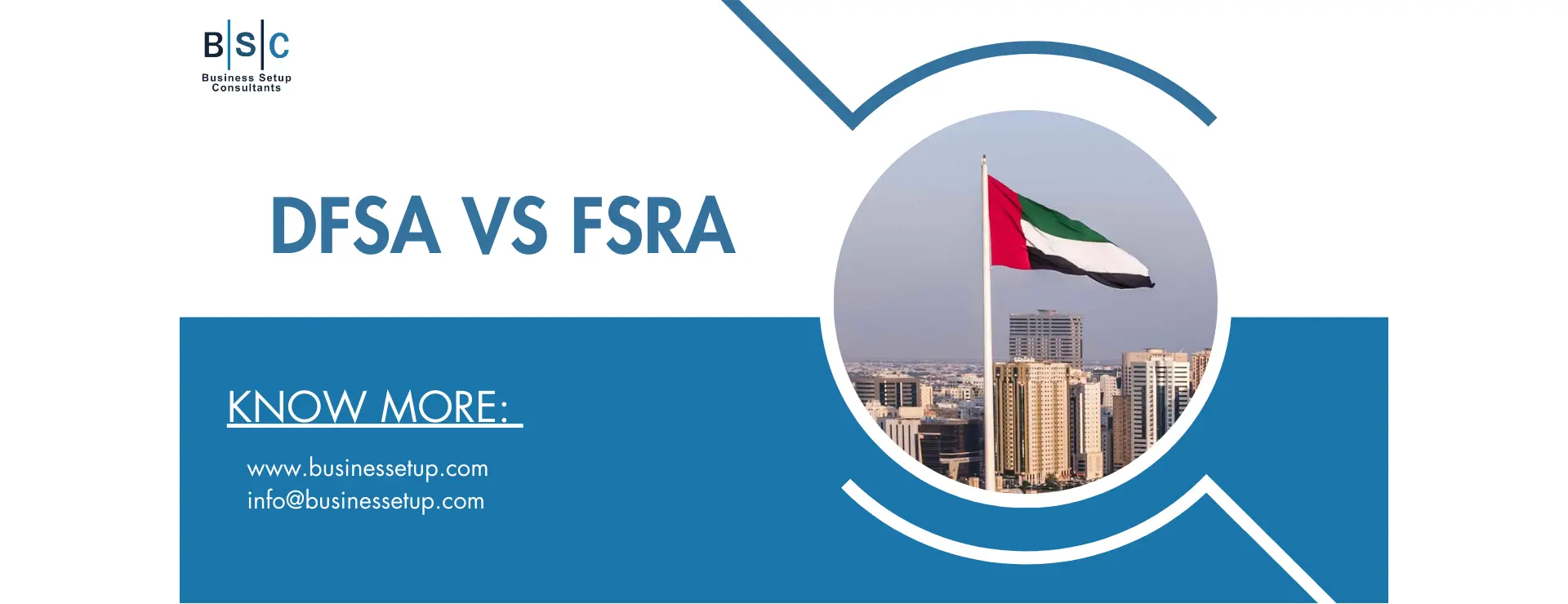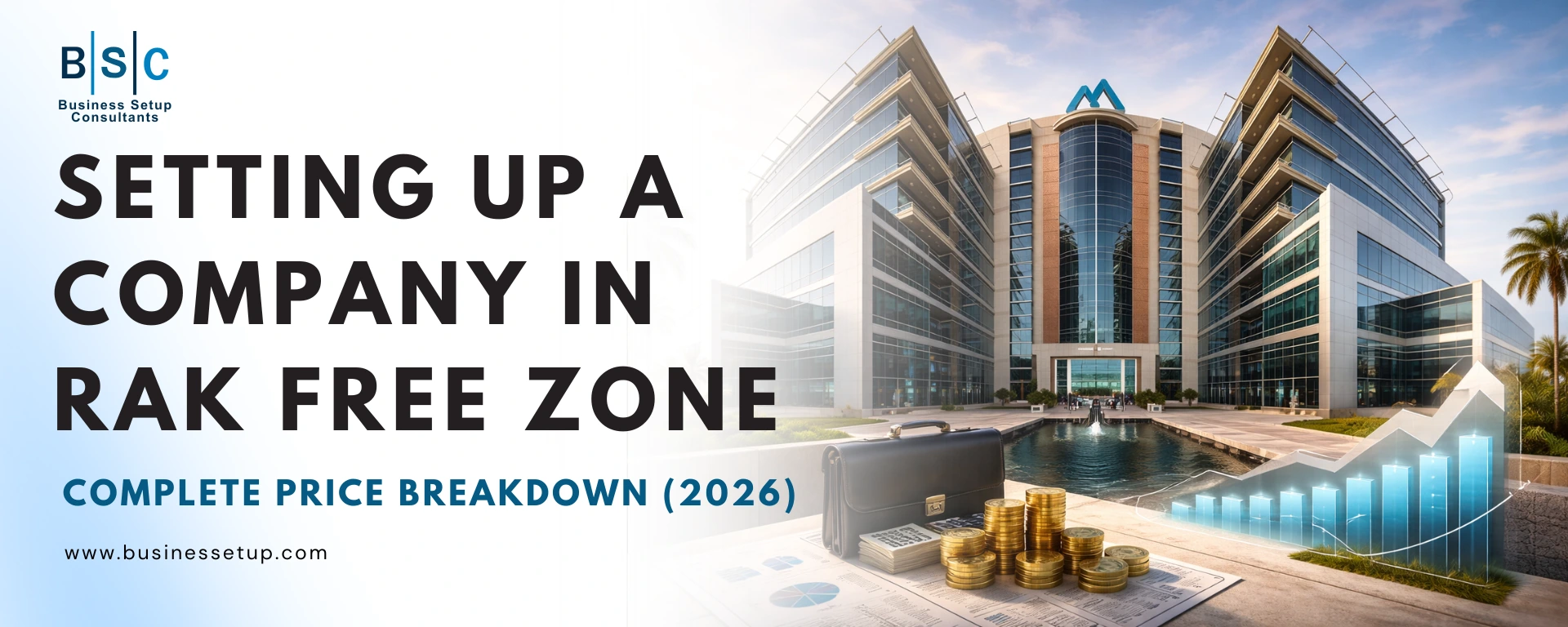
DFSA vs FSRA
DFSA and FSRA Dubai: Exploring Dubai’s Financial Regulatory Authorities
Dubai has emerged as a leading financial hub in the Middle East, attracting businesses from around the world to establish their operations within its strategic geographical location and business-friendly environment. To ensure the integrity and stability of the financial services sector, Dubai has established two distinct regulatory authorities: the Dubai Financial Services Authority (DFSA) and the Financial Services Regulatory Authority (FSRA).
Dubai Financial Services Authority (DFSA) and Financial Services Regulatory Authority (FSRA) are two regulatory bodies that operate in the United Arab Emirates. The DFSA operates in the Dubai International Financial Centre (DIFC) free zone , and FSRA operates in the Abu Dhabi Global Market (ADGM) free zone . The Dubai International Financial Center hosts numerous financial service institutions regulated by the UAE Central Bank and Financial Services Commission, offering a wide range of financial services within this thriving global hub.
This article will highlight their similarities and differences in regulatory objectives , legal framework, governance structure, regulatory powers, regulatory approach, supervisory practices, licensing process, enforcement actions, and international cooperation.
Dubai Financial Services Authority (DFSA)
Background and establishment
The DFSA was established in 2004 as an independent regulator of financial services within the Dubai International Financial Centre (DIFC), a purpose-built financial free zone.
Jurisdiction and scope
The DFSA’s jurisdiction extends to all financial and ancillary services conducted through the DIFC, including banking, capital markets, asset management, and insurance.
Regulatory framework and oversight
The DFSA operates under a principles-based regulatory framework aligned with international best practices, such as those of the Financial Conduct Authority (FCA) and the International Assessment. It oversees the licensing, supervision, and enforcement of DIFC-based authorised firms and authorised market institutions.
Types of licenses and activities regulated
The DFSA issues licenses for various financial activities, such as banking, investment, asset management, Islamic finance, capital requirement, virtual asset, and ancillary services.
Financial Services Regulatory Authority (FSRA)
Background and establishment
The FSRA was established in 2017 as the independent regulatory authority for financial services within the Abu Dhabi Global Market (ADGM), another international financial center in the UAE.
Jurisdiction and scope
The FSRA’s jurisdiction covers financial and ancillary services carried out within the ADGM, including banking, capital markets, asset management, and insurance.
Regulatory framework and oversight
The FSRA operates under a robust regulatory framework inspired by leading international practices, such as the Hong Kong Monetary Authority. It is responsible for licensing, supervising, and enforcing regulations for ADGM-based authorised persons.
Types of licenses and activities regulated:
The FSRA issues licenses for a range of financial activities, such as banking, investment, asset management, Islamic finance, anti-money laundering, and ancillary services, similar to the DFSA.
Key Differences Between DFSA and FSRA
Geographical jurisdiction
The DFSA regulates financial services within the DIFC, while the FSRA’s jurisdiction is limited to the ADGM.
Regulated entities and activities
Both authorities regulate similar types of financial and ancillary services, but within their respective jurisdictions.
Compliance and reporting obligations
The DFSA and FSRA have their own set of compliance and reporting requirements, such as the DFSA Rulebook and Regulatory Announcement Service, that licensed firms must adhere to within their respective jurisdictions.
Regulatory Objectives of DFSA vs FSRA
Operating in Dubai’s dynamic financial services sector requires a thorough understanding of the regulatory framework and the nuances between the DFSA and FSRA. By carefully evaluating their business objectives and operational requirements, firms can make an informed decision on the appropriate regulatory authority to ensure compliance and long-term success in this competitive market.
The DFSA’s regulatory objectives are to maintain the stability and integrity of the financial system in the DIFC, promote market confidence, protect consumers, and combat financial crime. On the other hand, the FSRA’s regulatory objectives are to foster a robust financial services sector in Abu Dhabi Global Market (ADGM), ensure the stability and integrity of the financial system, promote fair competition, protect consumers, and combat financial crime.
Additionally, adherence to federal laws, such as the Federal Law No. (8) of 2004 and the Dubai Law No. (9) of 2004, and international standards, like those set by the Financial Action Task Force (FATF), is crucial for financial institutions and national banks operating in the UAE financial services industry and sustainable finance initiatives.
Legal Framework of DFSA & FSRA
The DFSA operates under the Dubai International Financial Centre (DIFC) Regulatory Law , while the FSRA operates under the Abu Dhabi Global Market (ADGM) Regulatory Framework . Both these legal frameworks are designed to provide a comprehensive and flexible regulatory regime aligned with international best practices and standards. Both are based on common law principles.
Governance Structure
The DFSA is an independent regulator governed by a board of directors appointed by the Ruler of Dubai . The board is responsible for setting the strategic direction of the DFSA, while the Executive Chairman is responsible for the day-to-day management of the regulator. On the other hand, the FSRA is also an independent regulator governed by a board of directors appointed by the Abu Dhabi Executive Council. The board is responsible for setting the strategic direction of the FSRA, while the CEO is responsible for the day-to-day management of the regulator.
Regulatory Powers
The DFSA and FSRA have extensive regulatory powers to oversee and supervise financial services activities in their jurisdictions. These powers include issuing regulations, licensing and supervising financial institutions, investigating compliance with regulations, and imposing sanctions and penalties for non-compliance.
Regulatory Approach
The DFSA and FSRA have adopted a risk-based regulatory approach that focuses on identifying and managing risks to the stability and integrity of the financial system. This approach involves assessing the risk profile of individual financial institutions and applying appropriate regulatory interventions to mitigate these risks.
Supervisory Practices
The DFSA and FSRA have a robust supervisory culture emphasizing proactive engagement with financial institutions. This involves conducting regular on-site inspections, assessing the adequacy of risk management systems and controls, and providing guidance and feedback to institutions on compliance issues.
Licensing Process of FSRA and DFSA Dubai
The licensing process for financial institutions in the DIFC and ADGM is similar. The DFSA and FSRA require applicants to demonstrate that they have the financial resources, management expertise, and business plan to operate safely and soundly. The application process typically involves a comprehensive review of the applicant’s business model, risk management systems, compliance procedures, and governance arrangements.
Enforcement Actions
The DFSA and FSRA can take enforcement action against financial institutions that breach regulatory requirements. This may include issuing fines, suspending licenses, and taking legal action against individuals or entities that engage in prohibited activities.
International Cooperation
Both the DFSA and FSRA are committed to promoting international cooperation and collaboration with other regulatory bodies. This includes sharing information, conducting joint inspections, and participating in international regulatory forums.
Choosing the Right Regulatory Authority
Factors to consider
Businesses must carefully evaluate factors such as their intended business activities, target market, geographical location, and operational requirements when deciding whether to operate under the DFSA or FSRA.
Advantages and disadvantages of each authority
Each authority offers distinct advantages and potential drawbacks, which should be weighed against the specific needs and goals of the business.
Implications for businesses operating in Dubai
Choosing the appropriate regulatory authority has significant implications for a business’s operations, compliance obligations, and overall risk management.
Compliance and Regulatory Challenges
Common compliance issues and risks
Firms operating under the DFSA or FSRA must navigate various compliance challenges, such as anti-money laundering (AML), counter-terrorist financing (CTF), and data protection regulations, among others.
Keeping up with regulatory changes and updates
Both the DFSA and FSRA periodically update their regulations and guidelines, such as the DFSA’s Consultation Papers and the FSRA’s Financial Markets Tribunal, and firms must stay abreast of these changes to maintain compliance.
Importance of seeking professional advice and guidance
Given the complexity of the regulatory landscape, businesses are strongly advised to seek professional guidance from legal and compliance experts to ensure they meet all applicable requirements and mitigate risks.
Want to Learn More About DFSA & FSRA?
In summary, while the DFSA and FSRA have different regulatory objectives, legal frameworks, and governance structures, they share many similarities regarding their regulatory powers, approach, supervisory practices, licensing process, enforcement actions, and international cooperation.
If you want to inquire about which regulator or jurisdiction would be best for your business setup , please don’t hesitate to contact us for a free consultation.








